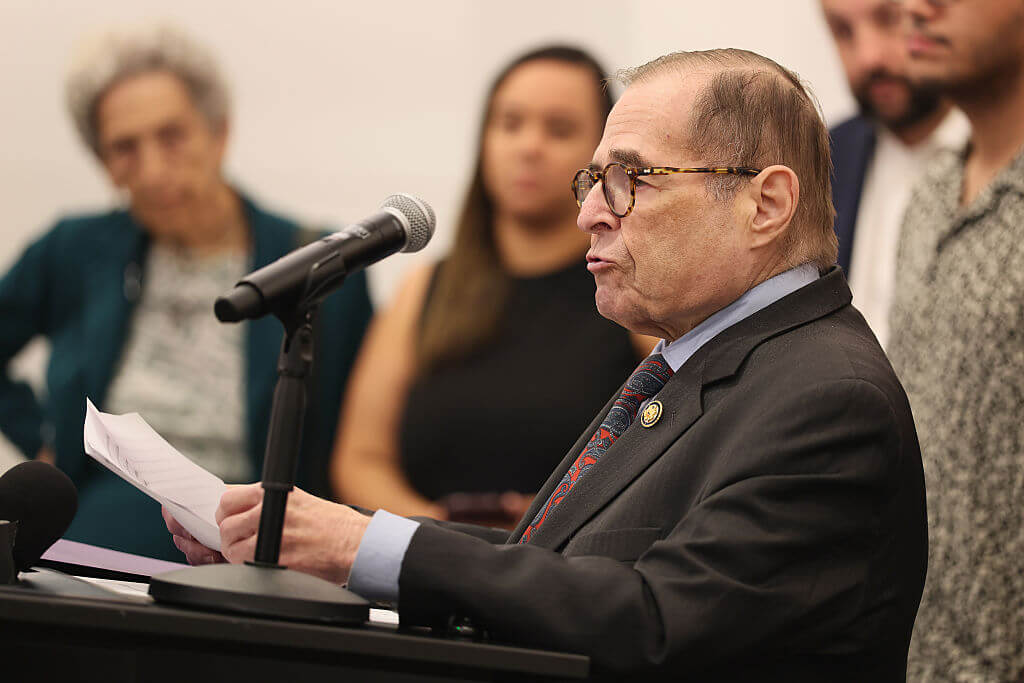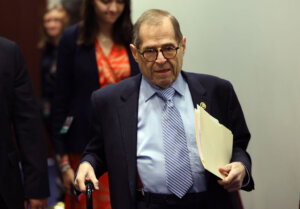Analysis: Nadler’s exit marks the end of an era for Jews in Congress. Will the next generation ‘do better’?
Nadler’s departure reflects a party in transition on Israel

Rep. Jerry Nadler (D-NY) on Aug. 11. Photo by Michael M. Santiago/Getty Images
Rep. Jerry Nadler’s announcement Monday evening that he will retire next year – after serving 17 terms in Congress – marks the end of an era for New York’s Jewish political influence.
In an interview with The New York Times, Nadler, who is 78, said his understanding of the need for generational change influenced his decision to step aside, as Democrats confront the challenges of resisting President Trump’s administration. A younger successor, he suggested, “can maybe do better, can maybe help us more.”
Nadler, a former Yeshiva student, has long been a pillar of Jewish representation in Congress. His departure underscores the narrowing pipeline of senior Jewish lawmakers who once defined Democratic power in New York and Washington.
Since the retirement of the late Rep. Nita Lowey and the defeat of Rep. Eliot Engel, Nadler was one of the most prominent voices on Capitol Hill alongside Senate Minority Leader Chuck Schumer, the nation’s highest-ranking Jewish elected official. Nadler is the longest-serving Jewish member and has served as dean of an informal group of Jewish Democrats in the House in recent years. (Rep. Dan Goldman, whose Brooklyn-Manhattan district overlaps parts of Nadler’s former turf, is also Jewish but has yet to reach that level of influence since his election in 2022.)
Nadler also made headlines after he was televised carrying a bag of Zabar’s food with him to the second impeachment of President Donald Trump in 2021.
Changing of the guard

Nadler has weathered tough electoral challenges. In 2022, Nadler won 55% of the vote in what was his most challenging reelection bid, facing fellow incumbent Carolyn Maloney in a redrawn Manhattan district, and a strong generational challenger, Suraj Patel. He won his 2024 race more comfortably, avoiding a primary and with 80% of the vote in the general election. But the surprise victory of Zohran Mamdani in the Democratic primary for New York City mayor in June indicated the start of a new era, led by a younger cohort with different priorities and political styles.
Immediately after Mamdani’s win, Liam Elkind, a 26-year-old Jewish activist, presented himself as a generational alternative to Nadler.
One of the favorites to succeed Nadler is Assemblymember Micah Lasher, 43, who shares the same liberal Zionist views as Nadler. Lasher has faced backlash from Jewish constituents in his Upper West Side district for helping rally Jewish support for Mamdani, whom some voters view warily because of his long history of criticizing Israel and his associations with pro-Palestinian groups. Another possible candidate is Julie Menin, a Jewish member of the Council who served as the city’s 2020 census director. Menin is currently in the mix for speaker of the 51-member chamber following the November elections.
In his Times interview, Nadler acknowledged that other aging Democrats should consider following suit but declined to name anyone.
Schumer could face a similar moment of reckoning ahead of a possible leadership vote after next year’s midterms and in anticipation of a likely 2028 primary challenge. He has already faced calls to step down from his role and has seen his popularity decline.
Nadler’s shift on Israel

Even before Nadler announced his retirement, he worked to define a new model of progressive support for Israel. He told the Forward in 2022 that he put “a lot of effort” into strengthening support for Israel among his colleagues amid growing criticism on the left.
He touted his support for a two-state solution to the Israeli-Palestinian conflict as necessary to preserve the Jewish and democratic nature of Israel and led opposition to legislation that would codify the controversial International Holocaust Remembrance Alliance definition of antisemitism — which classifies most anti-Zionism as antisemitic — because it could suppress constitutionally protected free speech on campuses.
But as the party’s approach to Israel has shifted with rising concern over civilian casualties and the dire humanitarian situation in Gaza, so has Nadler’s.
In recent months, Nadler has stepped up his criticism of the war in Gaza and sharpened his rhetorical attacks on Israeli Prime Minister Benjamin Netanyahu, accusing him of using “pathologically narcissistic, monomaniacal politics” to sabotage hostage negotiations and prevent a ceasefire.
Nadler told the Times he plans to support legislation to block the transfer of offensive weapons to Israel. In July, a record 27 Senate Democrats supported a pair of resolutions introduced by Sen. Bernie Sanders, the Jewish Vermont independent and longtime critic of U.S. aid to Israel, calling for the blocking of weapons transfers to Israel. That vote was followed by sharp criticisms of the Netanyahu government’s conduct by a growing number of mainstream Democrats, including Jewish governors and potential presidential candidates Josh Shapiro of Pennsylvania and JB Pritzker of Illinois.

















